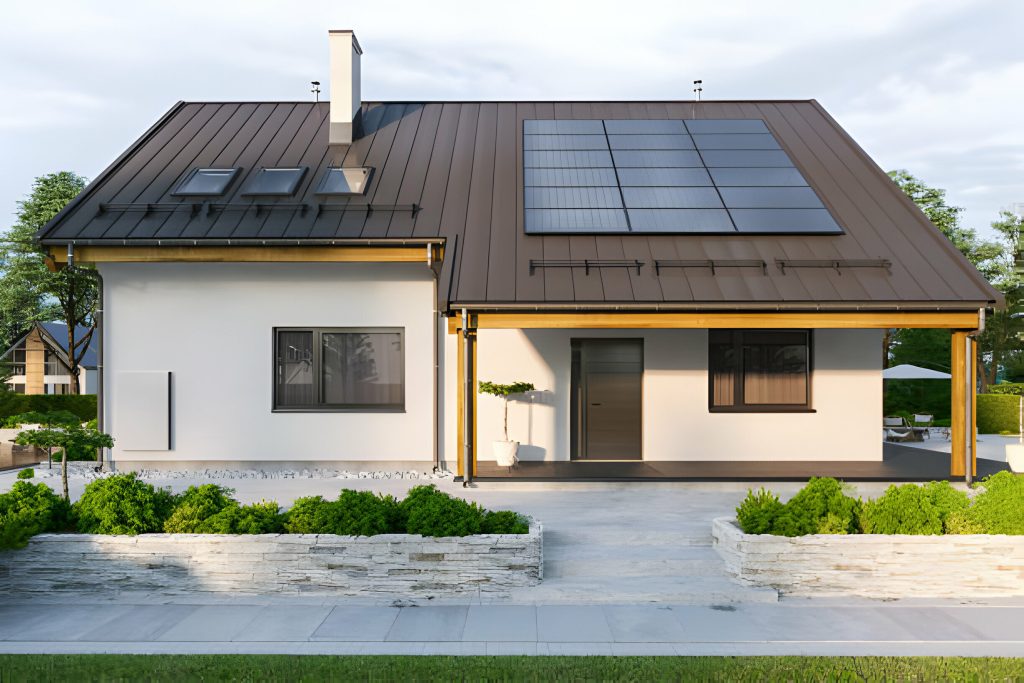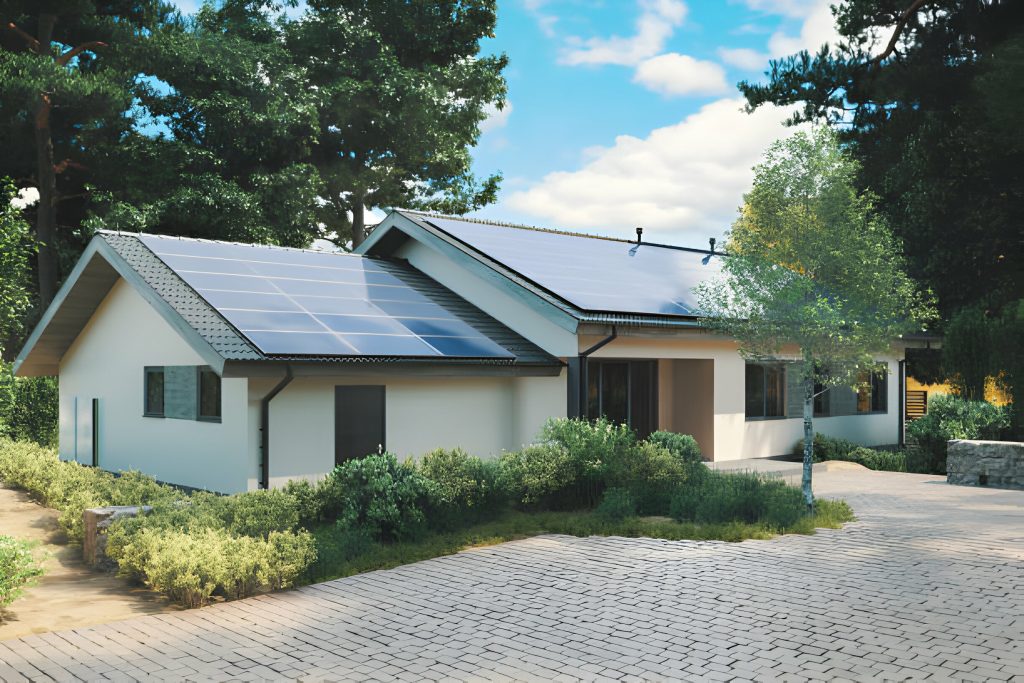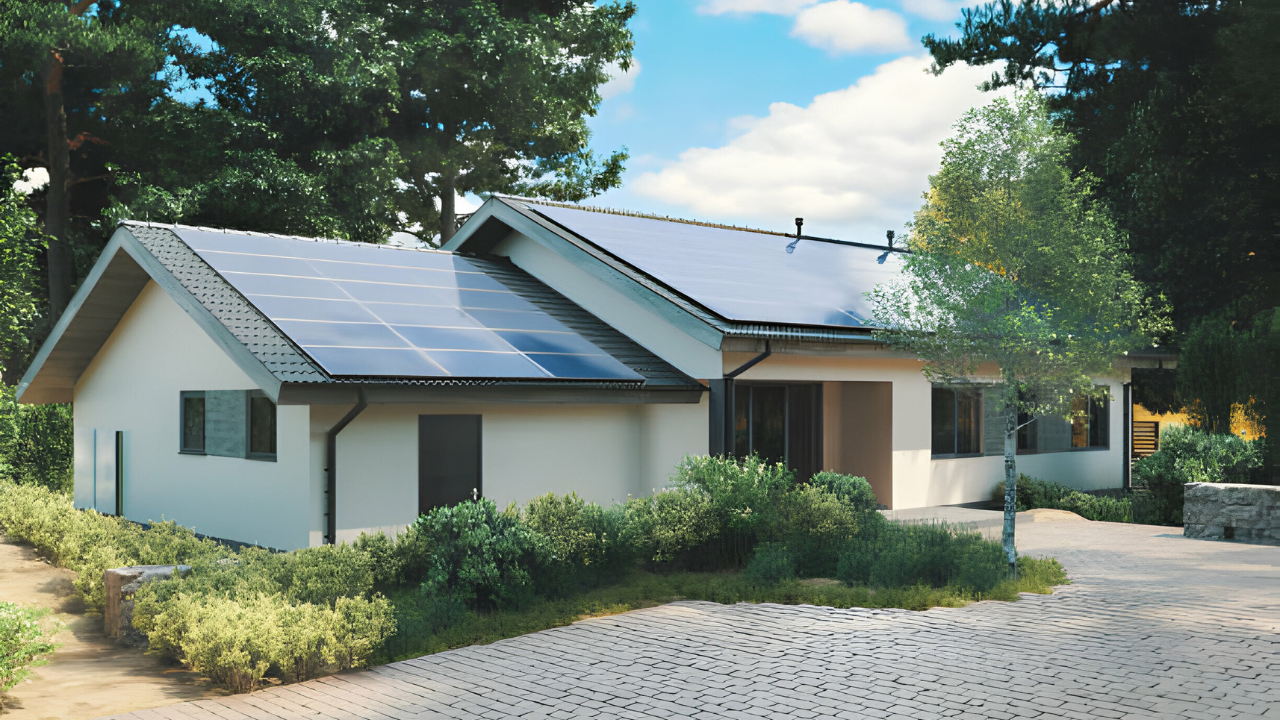A solar battery can power a house from a few hours to several days, depending on the battery capacity and the household’s energy usage. With proper sizing and installation, a solar battery system can provide continuous power to a house for an extended period, especially during daylight hours.
Solar power has become an increasingly popular choice for homeowners seeking to reduce their carbon footprint and lower electricity bills. The ability to store excess energy for later use through solar batteries has made this renewable energy source even more appealing.
We will explore the capabilities of solar batteries in powering residential properties and how long they can sustain a house with off-grid or backup power. We’ll also discuss the factors that can affect the duration of solar battery power and the considerations for homeowners looking to invest in this technology.
1. The Basics Of Solar Batteries
Solar batteries are an essential component of a solar-powered home. As renewable energy sources gain popularity, understanding the basics of solar batteries becomes increasingly essential. In this article, we’ll explore how solar batteries work and the different types available on the market.
1.1 How Do Solar Batteries Work?
A solar battery stores excess energy generated by solar panels during the day for use during periods of low sunlight or at night. This allows homeowners to maximize their energy independence and reduce reliance on the grid.
1.2 Different Types Of Solar Batteries
Several types of solar batteries are commonly used in residential solar energy systems. Each type has its unique characteristics and advantages:
- Lithium-Ion Batteries
- Lead-Acid Batteries
- Saltwater Batteries
- Nickel-Cadmium Batteries
2. Factors Affecting Solar Battery Performance
2. Factors Affecting Solar Battery Performance
2.1 Battery Storage Capacity
The battery storage capacity is critical in determining how long a solar battery can power a house. The amount of electricity a battery can store is measured in kilowatt-hours (kWh). Higher storage capacity enables the battery to supply power for longer, especially during low solar panel output periods or higher energy consumption.
2.2 Solar Panel Output
The solar panel output refers to the amount of electricity that solar panels can generate. It significantly influences how long a solar battery can power a house. Optimal positioning of solar panels, absence of shading, and high-efficiency panels contribute to maximizing solar energy production, enhancing the battery’s ability to recharge and provide sustained power to the house.
2.3 Household Energy Consumption
Household energy consumption directly impacts how long a solar battery can power a house. Reducing energy usage through energy-efficient appliances, insulation, and smart home technology can extend battery power duration. Monitoring and managing energy consumption patterns helps optimize the battery’s performance, ensuring sustainable power for the house.

3. Sizing A Solar Battery For Your Home
One crucial consideration when powering your house with solar energy is sizing the solar battery. Calculating your energy needs, determining battery capacity, and considering whether you need an off-grid or grid-tied system are all crucial steps in ensuring your solar battery can provide reliable power for your home. In this section, we will explore these factors in more detail.
3.1 Calculating Energy Needs
Before you can determine the appropriate size of the solar battery for your home, you need to calculate your energy needs. This involves assessing your daily electricity consumption and factoring in any seasonal variations. To simplify this process, you can consult your utility bills to understand your average monthly usage.
Once you have your monthly usage, you can use the following formula to estimate your daily energy consumption:
Daily Energy Consumption = Monthly Energy Consumption / 30
For example, if your average monthly energy consumption is 600 kilowatt-hours (kWh), your daily energy consumption would be approximately 20 kWh.
3.2 Determining Battery Capacity
With your daily energy consumption, you can now determine the solar battery capacity needed to power your home. Battery capacity is usually measured in kilowatt-hours (kWh), like energy consumption.
To ensure your battery can adequately meet your energy needs, it is generally recommended to have a battery capacity equal to or greater than your daily energy consumption.
For instance, if your daily energy consumption is 20 kWh, you would require a solar battery with a capacity of at least 20 kWh.
Remember that it may be beneficial to opt for a slightly larger battery to accommodate any future increase in energy needs or to account for any energy losses during storage and conversion processes.
3.3 Considerations For Off-grid Vs. Grid-tied Systems
Aside from calculating your energy needs and determining the battery capacity, it would be best to consider whether you require an off-grid or grid-tied system. This decision primarily depends on your level of self-sufficiency and your location.
Off-grid systems are suitable for homeowners not connected to the utility grid and rely solely on solar power. These systems typically require larger battery capacities to store excess energy generated during the day for use at night or during periods of low sunlight.
Grid-tied systems, on the other hand, are connected to the utility grid. They allow you to draw electricity from the grid when your solar panels don’t produce enough power, and you can also sell any surplus energy back to the grid. The battery capacity may be smaller with grid-tied systems since the grid is a backup power source.
Summary:
- Calculate your energy needs by assessing your monthly electricity consumption.
- Use the formula: Daily Energy Consumption = Monthly Energy Consumption / 30.
- Determine the battery capacity needed, aiming for at least equal to or greater than your daily energy consumption.
- Consider whether you require an off-grid or grid-tied system based on your self-sufficiency and location.

4. Maximizing The Efficiency Of Solar Batteries
When installing a solar battery system, it is crucial to maximize its efficiency so that you can make the most of your investment. You can implement several strategies to achieve this, including optimizing solar panel placement, using energy management systems, and exploring time-of-use rates. Let’s investigate these methods to ensure you get the most out of your solar battery’s power.
4.1 Optimizing Solar Panel Placement
The placement of your solar panels plays a significant role in maximizing the efficiency of your solar battery system. By considering a few key factors, you can optimize the positioning of your panels to capture the maximum amount of sunlight throughout the day.
Here are some tips for optimizing solar panel placement:
- Orient your solar panels towards the south to maximize exposure to the sun’s path.
- Ensure that trees, nearby buildings, or other obstructions do not shade your panels.
- Place your panels at the optimal angle to capture the most sunlight throughout the year.
- Regularly clean your panels to remove any dirt, dust, or other debris hindering their efficiency.
By following these guidelines, you can ensure that your solar panels generate the maximum amount of electricity possible, optimizing the performance of your solar battery system.
4.2 Using Energy Management Systems
Implementing an energy management system can significantly enhance the efficiency of your solar battery system by optimizing energy usage and minimizing waste. These systems use innovative technology to monitor and control your energy consumption, maximizing the benefits of your solar panel-generated electricity.
Some key benefits of using an energy management system include:
- Real-time monitoring of your energy usage allows you to identify areas where you can further reduce waste.
- Automated control of energy-intensive appliances, ensuring they run when solar production is at its peak.
- Integration with smart home devices, allowing you to manage and optimize your energy consumption efficiently.
By utilizing an energy management system, you can intelligently regulate your energy usage, making the most of your solar battery’s power and reducing your reliance on grid electricity.
4.3 Exploring Time-of-use Rates
Time-of-use (TOU) rates offer another opportunity to maximize the efficiency of your solar battery system. TOU rates are electricity pricing plans that vary based on the time of day, with different rates for peak, off-peak, and shoulder periods. Understanding and taking advantage of these rate structures allows you to optimize energy consumption to align with cheaper electricity prices.
Some benefits of exploring time-of-use rates include the following:
- Shifting energy usage to off-peak periods when lower electricity prices allow you to save on energy costs.
- You are using your solar battery to store excess energy during off-peak periods and using it when electricity prices are higher.
- You maximize your solar battery’s power by timing high-energy activities, such as running appliances or charging electric vehicles, during cheaper electricity rates.
Considering time-of-use rates and adjusting your energy consumption accordingly, you can effectively utilize your solar battery’s power while minimizing electricity expenses.
5. The Future Of Solar Battery Technology
Solar battery technology is advancing rapidly, providing longer-lasting power for houses. Discover how solar batteries can effectively power your home for extended periods without relying on the grid.
Solar battery technology continues to advance rapidly, opening up exciting possibilities. This section will explore some critical advancements, integration with smart homes, and the potential for achieving energy independence.
5.1 Advancements In Battery Technology
Advancements in solar battery technology are constantly being made, ensuring more efficient and longer-lasting batteries.
Manufacturers work tirelessly to improve these batteries’ energy storage capacity and power output. For example, new battery chemistries such as lithium iron phosphate (LiFePO4) offer higher energy density, improved safety, and increased lifespan than traditional lead-acid batteries.
Moreover, innovative research is underway to develop solid-state batteries, which promise even greater energy densities and faster charging times. These advancements in solar battery technology are crucial in making renewable energy more viable and accessible to everyone.
5.2 Integration With Smart Homes
Integrating solar batteries with smart homes is another fascinating aspect of the future. With the rise of smart home technologies, homeowners can now actively manage their energy consumption, optimizing their solar battery usage for maximum efficiency.
By integrating solar batteries with smart home systems, homeowners can monitor their energy usage in real time, identify patterns, and make informed decisions regarding their energy consumption.
This level of control allows homeowners to reduce their reliance on the grid further while maximizing the use of stored solar energy.
5.3 The Potential For Energy Independence
One of the most exciting aspects of solar battery technology is the potential for achieving energy independence. By combining solar panels with advanced battery storage systems, homeowners can generate and store their electricity during the day and utilize it during times of higher energy demand or when the sun is not shining.
This increased self-sufficiency eliminates the need to rely solely on the grid for electricity, resulting in reduced utility bills and a decreased environmental impact. Furthermore, it provides homeowners a reliable backup power source during grid outages or emergencies.
| Benefits of Solar Battery Technology: |
|---|
| – Increased energy storage capacity |
| – Higher power output |
| – Improved safety and lifespan |
| – Integration with smart home systems |
| – Potential for achieving energy independence |
In conclusion, the future of solar battery technology is bright. Advances in battery technology, integration with smart homes, and the potential for energy independence are all essential factors driving the widespread adoption of solar power. As research and development continue to push the boundaries, we can look forward to a future where clean and sustainable energy is readily available to power our homes.
How long will a 5 kWh battery last
The duration a 5 kWh (kilowatt-hour) battery will last depends on several factors:
- Power Consumption: How much power (in kilowatts) your devices or appliances consume.
- Load: The power drawn from the battery at any given time.
- Efficiency: The efficiency of the battery and any inverters or converters used in the system.
- Depth of Discharge: Typically, it’s not recommended to discharge a battery completely, as it can shorten its lifespan. The battery’s usable capacity may be less than its rated capacity (5 kWh).
- Usage Pattern: How frequently and for how long is the battery used?
Assuming you have a consistent power draw and the battery is discharged evenly over its capacity, you can calculate the duration it will last by dividing the total capacity of the battery by the power draw.
For example:
- If you have a 1 kW (kilowatt) load, the battery would last for 5 hours (5 kWh / 1 kW = 5 hours).
- If you have a 0.5 kW load, the battery
would last for 10 hours (5 kWh / 0.5 kW = 10 hours).
However, it’s essential to consider that real-world scenarios might involve fluctuations in power consumption, variations in battery efficiency, and other factors that could affect the duration. Additionally, if you’re using the battery in conjunction with renewable energy sources like solar panels, the charging rate and availability of sunlight will also impact how long the battery lasts.
How long will my solar battery last calculator
To calculate how long a solar battery will last, you need to consider the battery capacity and the power consumption of your devices.
Here’s a simple formula:
Battery life (hours)=Battery capacity (kWh)Power consumption (kW)Battery life (hours)=Power consumption (kW)Battery capacity (kWh)
For example, if you have a 5 kWh battery and your devices consume 1 kW of power, the battery would last for 5 kWh1 kW=5 hours1 kW5 kWh=5 hours.
You can use this formula with your specific battery capacity and power consumption to find out how long your solar battery will last.
How long will 10 kWh power a home
The duration that 10 kWh (kilowatt-hours) can power a home depends on various factors, including the energy consumption rate of the home, the efficiency of appliances, and the time of usage.
To give you a rough idea:
- Average Home Consumption: The average home in the United States consumes around 877 kWh per month, which translates to about 29 kWh per day. This figure can vary widely depending on factors like the size of the home, the number of occupants, the climate, and energy-efficient practices.
- Time Period: If we assume a constant power consumption rate throughout the day, 10 kWh could power a home for approximately 10/29 = 0.34 days, or roughly 8 hours. However, this is a simplistic calculation and doesn’t take into account the fluctuating energy usage throughout the day.
- Efficiency and Energy Usage Patterns: Energy-efficient appliances, smart home technologies, and conscious energy usage can significantly affect how long 10 kWh will last. For instance, if a home utilizes energy-saving appliances and LED lighting and practices energy conservation measures, it may last longer than a home with less efficient appliances and wasteful habits.
- Seasonal Variation: Energy usage tends to vary seasonally, with higher consumption during extreme temperatures due to heating or cooling needs.
- Renewable Energy Sources and Battery Storage: If the home is equipped with renewable energy sources like solar panels and battery storage systems, it can potentially extend the duration that 10 kWh can power the home by storing excess energy generated during periods of low consumption.
To accurately determine how long 10 kWh would power a specific home, you would need to analyze the home’s energy usage patterns, appliance efficiency, and other relevant factors.
Frequently Asked Questions For How Long Can A Solar Battery Power A House
How Long Can A Solar Battery Power A House?
A solar battery can power a house for several hours to several days, depending on various factors such as the battery’s capacity, the power consumption, and the amount of sunlight available for charging the battery. A typical solar battery can power a house for around 4 to 8 hours at night or on cloudy days.
However, powering a house for even longer durations is possible with a larger battery capacity and optimized energy usage.
Can A Solar Battery Power A House Indefinitely?
No, a solar battery cannot power a house indefinitely. Solar batteries store excess solar energy generated during the day, which can be used at night or on cloudy days when the solar panels can’t produce enough power. However, the amount of energy a solar battery can store is limited, eventually depleting it.
The time a solar battery can power a house depends on battery capacity, energy consumption, and sunlight availability.
How Can I Maximize The Power Of A Solar Battery For My House?
To maximize the power of a solar battery for your house, you can follow these tips:
1. Optimize energy usage: Use energy-efficient appliances and adopt energy-saving habits to reduce power consumption.
2. Install more solar panels: The more solar panels you have, the more energy you can generate and store in the battery.
3. Opt for a larger battery capacity: Invest in a solar battery with a higher capacity to store more energy.
4. Utilize peak sunlight hours: Use appliances and charge devices during the day when the solar panels produce the most energy.
5. Regular maintenance: Clean the solar panels regularly to ensure maximum efficiency and power generation. By implementing these strategies, you can make the most of your solar battery and extend the power supply for your house.
How long does a solar battery last at night?
A solar battery can last throughout the night, providing power until the sun rises again the next day.
How many hours will a 5kw battery last?
The duration a 5kW battery lasts depends on the power consumption of the devices it’s powering. However, if we assume a constant power draw of 5kW, the battery would last for 1 hour.
How many solar batteries are needed to power a house?
The number of solar batteries needed to power a house depends on the house’s energy consumption and the capacity of the batteries. It varies widely and requires individual assessment.
How long can solar batteries store electricity?
Solar batteries can typically store electricity for several hours to several days, depending on factors such as battery capacity, energy usage, and weather conditions.
Conclusion
Solar batteries have revolutionized the way we power our homes. With advancements in technology, solar batteries can now store enough energy to provide electricity to a house for several days. This means homeowners can rely more on renewable energy and reduce their dependence on the grid.
As solar battery technology continues to improve, we can expect even longer power supply durations and more sustainable energy solutions for the future. Embracing solar power is environmentally friendly and an intelligent choice for a more sustainable future.

I am Nishadujjaman.I have two years of experience all types of battery like tesla battery,car battery etc. So I work on solving these issues and give various tips on these issues.
